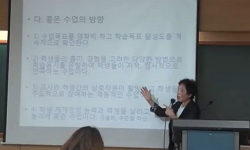본 연구의 목적은 액션 러닝 학습법을 적용한 대학 교양수업에서 학습자 주도적인 활동을 통해 환경에 대한 언어적, 정서적, 행동적 태도의 변화가 있음을 확인하는 것이다. 이를 위해 수업...
http://chineseinput.net/에서 pinyin(병음)방식으로 중국어를 변환할 수 있습니다.
변환된 중국어를 복사하여 사용하시면 됩니다.
- 中文 을 입력하시려면 zhongwen을 입력하시고 space를누르시면됩니다.
- 北京 을 입력하시려면 beijing을 입력하시고 space를 누르시면 됩니다.

대학 교양수업 ‘ESG 기반의 생태 영성 및 그린 캠퍼스 형성’의 팀 활동을 통한 환경 인식 및 태도 변화 연구 = A Study on Environmental Awareness and Attitude through Team Activities in the University Liberal Arts Course ‘ESG-Based Ecological Spirituality and Green Campus Formation’
한글로보기부가정보
국문 초록 (Abstract)
본 연구의 목적은 액션 러닝 학습법을 적용한 대학 교양수업에서 학습자 주도적인 활동을 통해 환경에 대한 언어적, 정서적, 행동적 태도의 변화가 있음을 확인하는 것이다. 이를 위해 수업에 참여하는 학습자는 ESG의 개념과 우리 사회에서 진행되고 있는 다양한 ESG 활동에 대한 고찰을 진행하고, E(Environment, 환경)에 중점하여 그린 캠퍼스 형성이라는 명확한 목표를 가지고 팀 활동을 진행하였다. 학습자들은 팀을 기반으로 그린 캠퍼스 활동을 계획하여 1차 활동을 실천하고, 활동 후 동료 학습자들로부터 피드백을 수렴하여 수정 계획을 수립하여 2차 활동을 진행하였다. 1, 2차 활동을 수행한 후, 팀 활동의 과정 및 성과를 수업에서 발표하였다. 연구 대상은 충남 천안시에 소재하고 있는 H 대학교의 교양수업인 ‘ESG기반의 생태 영성 및 그린 캠퍼스 형성’을 수강하는 23명의 대학생을 대상으로 진행하였다. 이들의 환경 인식 및 태도의 변화를 비교하기 위하여 첫 수업에서 사전 설문조사를 실시하고, 학기 말인 14주차에 사후 설문조사를 실시한 후, 기술통계분석과 대응표본 t-test로 분석하였다. 또한 수업에서 작성한 성찰 활동지와 수업에 대한 만족도 및 팀 활동에 대한 개방형 질문을 통해 수업 참여자들의 응답 내용을 워드 클라우드를 이용하여 분석하고, 연구자의 관찰 내용을 분석하였다. 연구분석 결과, 학습자의 환경에 대한 언어적 태도와 행동적 태도는 유의미한 수준의 변화가 나타났고, 환경에 대한 정서적 태도에 있어서는 부분적으로 유의미한 수준의 변화를 보였다. 이는 학습자들이 이미 정서적으로 환경 위기에 대해 높은 수준으로 심각성을 느끼고 있었지만, 언어나 행동과 같이 겉으로 드러나지 못했던 부분들이 수업을 통해 유의미한 수준의 변화로 나타난 것이라고 판단할 수 있다. 수업에 참여한 학생들은 자신의 환경에 대한 정서적 태도에 부합한 언어적 태도와 행동적 태도의 변화를 가질 수 있게 되는 긍정적인 효과를 보여주었다. 이는 생태 위기의 시대를 지나고 있는 인류에게 환경에 대한 인식 및 태도의 변화를 위한 생태교육의 중요성과 학습자 주도의 교수법이 학습자의 행동의 변화를 위해 효과적임을 명확히 시사하고 있다.
다국어 초록 (Multilingual Abstract)
The purpose of this study is to confirm changes in verbal, emotional, and behavioral attitudes toward the environment through learner-driven activities in a university liberal arts course that applies the action learning methodology. To achieve this, ...
The purpose of this study is to confirm changes in verbal, emotional, and behavioral attitudes toward the environment through learner-driven activities in a university liberal arts course that applies the action learning methodology. To achieve this, students participating in the course examined the concept of ESG and various ESG activities taking place in society, with a focus on the "E" (Environment). With a clear goal of forming a green campus, they engaged in team-based activities. The learners planned and implemented an initial green campus activity as a team, collected feedback from their peers afterward, and then revised their plan to carry out a second round of activities. After completing both the first and second activities, they presented the process and outcomes of their team activities in class. The study was conducted with 23 students enrolled in the liberal arts course “ESG-Based Ecological Spirituality and Green Campus Formation” at H University in Cheonan, Chungnam. To compare changes in environmental awareness and attitudes, a pre-survey was conducted in the first class, and a post-survey was conducted in the 14th week at the end of the semester. The data were analyzed using descriptive statistics and a paired sample t-test. Additionally, satisfaction with the course and responses to open-ended questions about the team activities were analyzed using word cloud analysis. The results of the analysis showed significant changes in the learners' verbal and behavioral attitudes toward the environment, and partial significant changes in their emotional attitudes. This suggests that while learners already felt a high level of seriousness about the environmental crisis emotionally, aspects such as verbal and behavioral attitudes that were not outwardly expressed showed meaningful changes through the course. Students who participated in the course demonstrated a positive effect in aligning their verbal and behavioral attitudes with their emotional attitudes toward the environment. This clearly indicates the importance of ecological education for raising awareness and changing attitudes toward the environment for humanity in the age of ecological crisis, as well as the effectiveness of learner-centered teaching methods in promoting behavioral changes in learners.
동일학술지(권/호) 다른 논문
-
『그 사람 모세와 일신론적 종교』에 나타난 지그문트 프로이트의 종교 이해에 대한 비판적 소고(小考)
- 한국실천신학회
- 이수미
- 2025
- KCI등재
-
- 한국실천신학회
- 홍순원
- 2025
- KCI등재
-
지속가능한 초고령사회를 위한 경제생활: 볼프의 ‘번영’ 개념을 중심으로
- 한국실천신학회
- 이상훈
- 2025
- KCI등재
-
- 한국실천신학회
- 황창진
- 2025
- KCI등재




 KCI
KCI eArticle
eArticle




